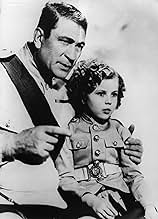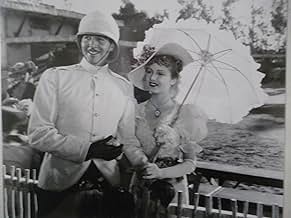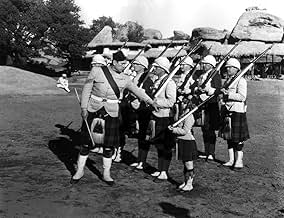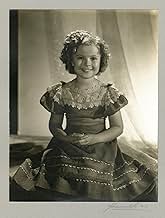Priscilla Williams, una joven que vive con su madre viuda y su abuelo paterno en el puesto que dirige en el norte de la India, se enamora de la vida militar y se ve envuelta en una rebelión ... Leer todoPriscilla Williams, una joven que vive con su madre viuda y su abuelo paterno en el puesto que dirige en el norte de la India, se enamora de la vida militar y se ve envuelta en una rebelión contra la corona a principios de 1900.Priscilla Williams, una joven que vive con su madre viuda y su abuelo paterno en el puesto que dirige en el norte de la India, se enamora de la vida militar y se ve envuelta en una rebelión contra la corona a principios de 1900.
- Dirección
- Guionistas
- Elenco
- Nominado a 1 premio Óscar
- 2 premios ganados y 1 nominación en total
- Elsie Allardyce
- (as Lauri Beatty)
Opiniones destacadas
With Temple's previous screen efforts typically casting her as an orphan or child of a widowed parents who occupies screen time solving problems with feel good intervals of song and dance, WEE WILLIE WINKIE is a welcome change of pace. While Temple doesn't have any real musical interludes, she does acquire one heartfelt moment worth mentioning where she sings "Auld Lang Syne" to a dying soldier. Of her two 1937 releases, HEIDI, based on the literary work by Johanna Spyri, appears to be most admired mainly because it gears mostly towards the interest of children while WEE WILLIE WINKIE appears to be more of a story for adults. Being the longest (99 minutes, though road show version was reportedly at 105 minutes) of Temple's feature length films of the 1930s, WEE WILLIE WINKIE contains more ingredients of a John Ford movie than Temple's. Regardless, the chemistry of both blends in nicely into the scenario. Temple would work under Ford again in FORT APACHE (RKO, 1948) with McLaglen in the supporting cast.
Plot summary: The year is 1897. Joyce Williams (June Lang), a young widow unable to support herself and her daughter, Priscilla (Shirley Temple), in America, are sent by her father-in-law, Colonel Williams, to live with him on his British Army Base. Arriving by train to Raj Pore station in Northern India, they are greeted by Sergeant McDuff (Victor McLaglen) to escort them via coach to their destination. Before departure, Priscilla witnesses the arrest of Khonda Khan (Cesar Romero), the rebel leader responsible for the smuggling of guns belonging to her grandfather's regiment. Having dropped his sacred charm, Priscilla runs over return "the necklace" back to him. Khan, dangerous and handcuffed, shows gratitude towards this "strange child" as he is taken away by authorities. During her stay at the post, Priscilla meets Branders (Michael Whalen), a young lieutenant she calls "Coppy" (whose hair, as she described, shines like a copper penny). Feeling her grandfather (C. Aubrey Smith) doesn't like her McDuff, at Coppy's request, shows Priscilla the procedures on becoming a good soldier. Providing her a junior-sized uniform, much to the dismay of drummer boy, Mott (Douglas Scott), McDuff renames his little soldier, "Wee Willie Winkie." With an uprising leading to the prison escape of Khonda Khan and the death of Sergeant McDuff, war is officially declared, causing "Wee Willie Winkie" to try and make peace before any more men are killed.
While Temple dealt with grumpy grandfathers before, Lionel Barrymore being her best encounter in THE LITTLE COLONEL (1935), C. Aubrey Smith fits the bill as her military-minded grandfather with little time for his grandchild. Cesar Romero, believable as Konda Khan, gives a remarkable performance. He would assume another recognizable, but less threatening role, opposite Temple once more in THE LITTLE PRINCESS (1939). Military formation and the lives of British soldiers take precedence over the romantic subplot between June Lang and Michael Whalen that has been kept to a minimum. Others in the cast include Constance Collier (Mrs. Allardyce); Lauri Beatty (Elsa Allardyce, her daughter); Willie Fung (Mohammed Dihn); Brandon Hurst (Bagby); Lionel Pape (Major Allardyce); Mary Forbes (Mrs. MacMonachie), and John Ford regular, Jack Pennick, as one of the soldiers.
A successful film in its day, WEE WILLIE WINKIE was later reissued at 77 minutes, the print most commonly used on commercial television prior to 1985. It wasn't until around 1987 when WEE WILLIE WINKIE was available close to its theatrical length when distributed on home video. In recent years, the 99 minute version became available on numerous cable stations, including The Disney Channel (colorized, 1990s); American Movie Classics (1996-2000), The Fox Movie Channel and Turner Classic Movies (TCM premiere: July 13, 2015). It's availability on DVD contains the choice of both colorized and black and white formats.
While Temple may seem to be an unlikely candidate on a military base in far away India wanting to become a good little soldier, she's certainly one who hasn't lost her appeal in the rank as "Wee Willie Winkie." (***1/2)
But when all is said and done it's a cavalry picture, just like Fort Apache, She Wore a Yellow Ribbon, and Rio Grande. The same rough house monkeyshines among the troops, the same tribute to regimental tradition and of course the same Victor McLaglen. All military units for Ford are the same, be they the Scotch Highlanders posted to India or the Seventh Cavalry fighting the Indians.
Little Shirley and her mother June Lang go to live with Shirley's grandfather, C. Aubrey Smith, colonel of a regiment on India's northern frontier. He's a spit and polish soldier of the old school, but like she does in all her films, the little moppet melts the old guy.
But she does more than that. She also gets into the heart of bandit chief Cesar Romero who probably gives the best performance in the film. He's a warrior chief fighting for his people, but he's light years removed from the terrorists of today. Since Shirley is the only one on speaking terms with Smith and Romero, she stops a frontier uprising as well.
Wee Willie Winkie will not go down as one of John Ford's greater films, but it's decently entertaining enough. And I'm sure he didn't care about filming a Kipling story because with Shirley Temple in the lead it was going to make money.
They were also shorter, too. At 100 minutes, this is too long a movie for the normal Temple fare. It was her longest movie as a child actor. The major fault, which also involves the time, is that is simply wasn't that interesting.
It has its cute moments as all Temple films did and the cinematography was good. The fact John Ford directed it may have something to do with the better-than-average photography. I also enjoyed Victor McLaughlen in here. He played the best character.
This was arguably Shirley Temple's finest film. It is certainly her most lavish. Fox & director John Ford fashioned a mini-epic with great atmosphere and much to please family viewers. The detailed sets & huge cast of extras do the picture proud.
Shirley is wonderful, as usual, in her own unique way, but this time she has a couple of co-stars that can hold their own with her. Victor McLaglen is every inch the embodiment of a bluff British sergeant - and well he should, given his real-life background as a boxing champion and Provost Marshal of Baghdad. Gruff & tender by turns, he gives an unforgettable performance. As Shirley's grandfather, marvelous old Sir C. Aubrey Smith gives another sterling portrayal as the archetype of the colonial officer class - crusty & domineering.
The rest of the cast is equally enjoyable: Cesar Romero as the chieftain; June Lang & Michael Whalen as Shirley's mother and her new lieutenant friend (fortunately their romance is unobtrusive); Willie Fung as the giggling, treacherous house boy; and Constance Collier as the waspish wife of a brigade officer.
¿Sabías que…?
- TriviaShirley Temple disclosed in her autobiography that this was the only film she made in which she received an onscreen spanking, much to the chagrin of June Lang who played the spanker and feared that her career would suffer as a result of the audience seeing the popular Shirley being treated in this fashion. The scene was shot but cut from the final film.
- Citas
Priscilla Williams: [on her new nickname] Wee Willie Winkie. It does sound like a soldier, doesn't it?
Sgt. Donald MacDuff: Aye.
Priscilla Williams: Then I'd be Private Winkie!
Sgt. Donald MacDuff: Private Winkie it is. A full-fledged soldier of the Queen!
- Versiones alternativasAlso available in a computer colorized version.
- ConexionesFeatured in The World According to Smith & Jones: The Victorians (1987)
- Bandas sonorasAuld Lang Syne
(1788) (uncredited)
Traditional
Music Arranged by Alfred Newman and Herbert W. Spencer
Lyrics by Robert Burns
Sung a cappella by Shirley Temple
Selecciones populares
- How long is Wee Willie Winkie?Con tecnología de Alexa
Detalles
- Fecha de lanzamiento
- País de origen
- Idioma
- También se conoce como
- Čuvarji Indije
- Locaciones de filmación
- Productora
- Ver más créditos de la compañía en IMDbPro
- Tiempo de ejecución
- 1h 40min(100 min)
- Relación de aspecto
- 1.37 : 1






































